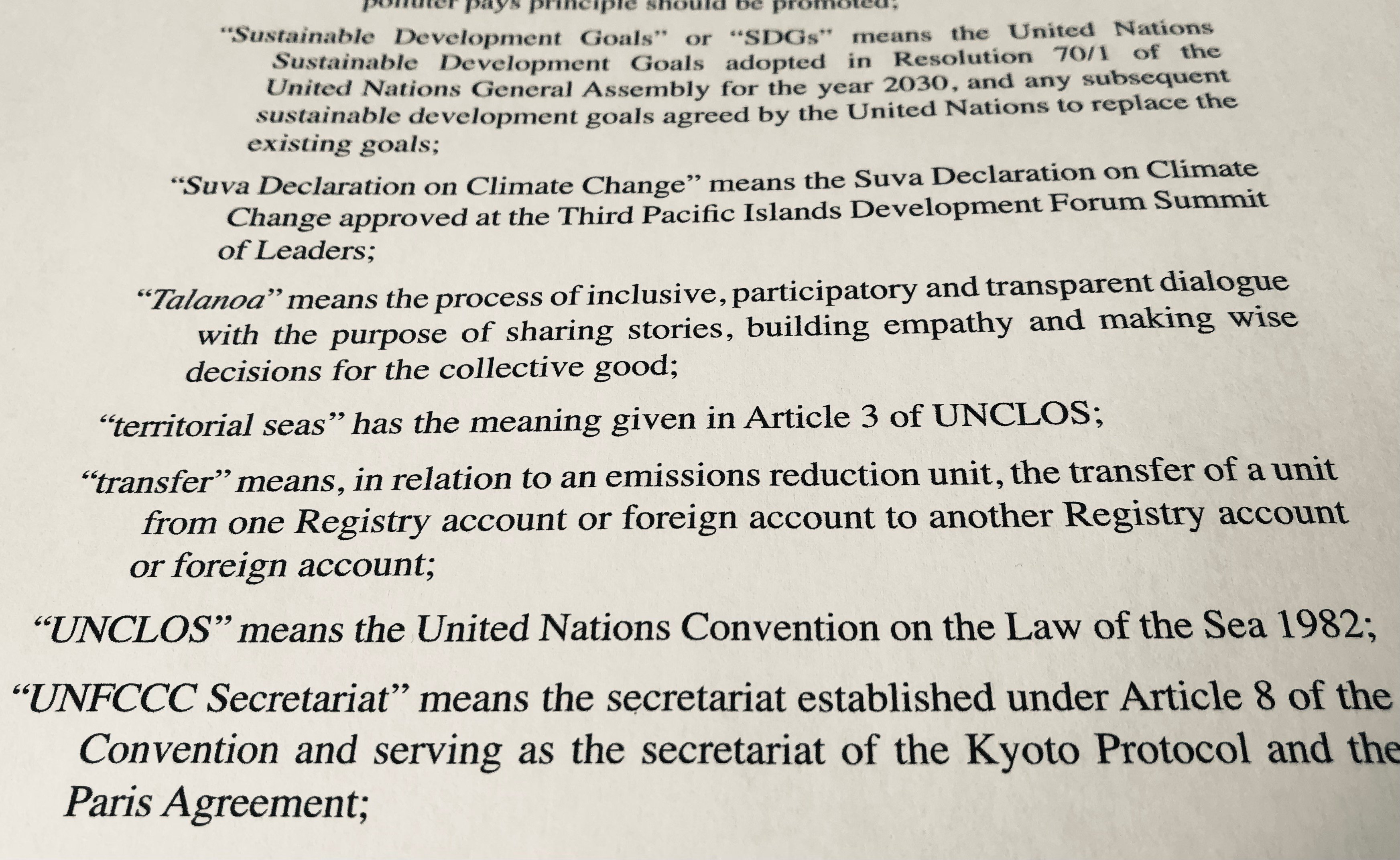The Climate Change Act 2021 (hereinafter referred to as “the Act”) is the Fiji government’s groundbreaking and proposed legislative approach to the threat of climate change caused by human activity.
Over 93 pages, divided into 17 Sections with 112 sections, the Act provides Fiji’s intended response to the enormous challenges that face all 195 nations and their peoples.
In this bulletin we provide a detailed (and we hope) explanatory analysis of the Act. Please note that the Act has been passed by Fiji's Parliament (on 23 September 2021), and it will be brought into force in due course by the relevant Minister by notice published in the Gazette.
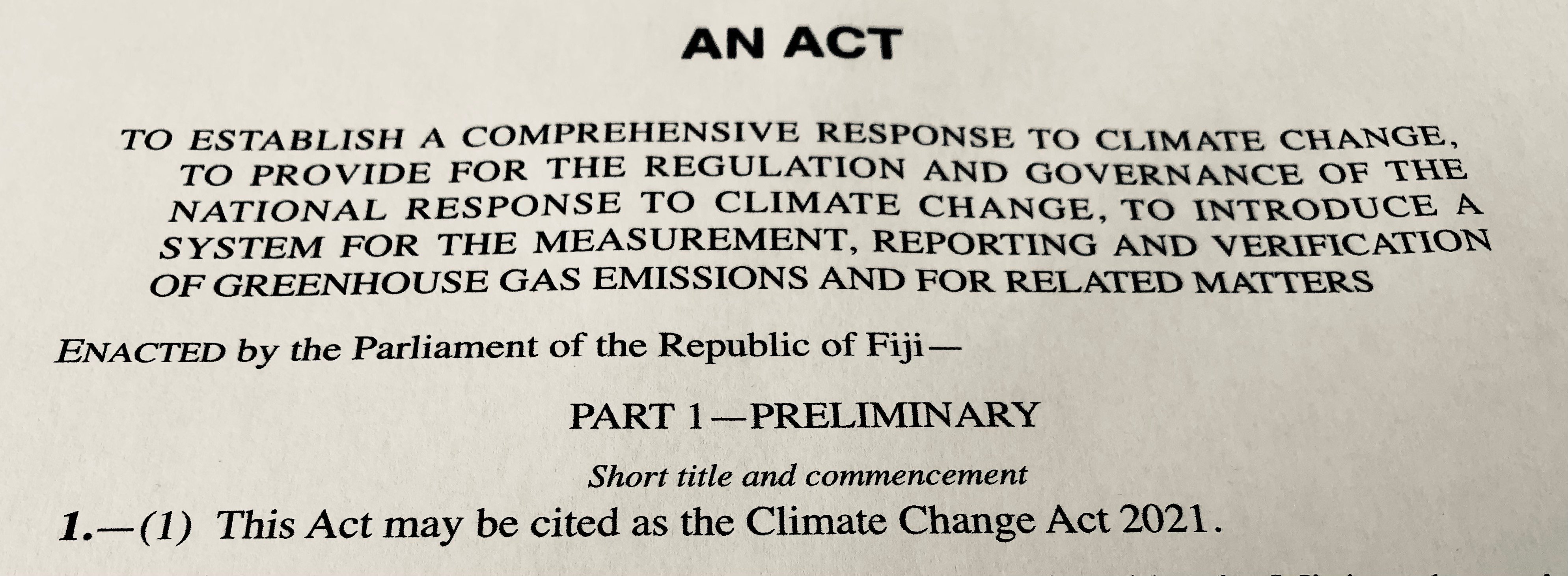
The Act provides a framework for “a whole of government approach” to meet the following fundamental objectives, being:
1. To reduce the production of greenhouse gases and accurately measure that reduction in accordance with international law standards
2. To boost Fiji’s efforts at carbon sequestration meaning the removal and storage of carbon in its natural environment
3. To respond and adapt to the destructive effects of climate change
4. To improve the health and security of Fiji’s oceans for a number of reasons including the role of the ocean in mitigating the effects of climate change
5. Secure and coordinate sustainable climate financing for Fiji.
These objectives have significant implications for Fiji’s economy. This is because policies will be set and implemented via a variety of government decisions including Regulations that will measure and aim to reduce emissions in accordance with the international framework developed via the United Nations’ Paris Agreement. This means that existing ways of operating in certain industries and in relation to certain activities will be subject to greater scrutiny and restrictions. As emissions are more accurately measured then eventually those who create more carbon than is permitted are likely to be subjected to adverse financial consequences and other measures to disincentivise their current activities forcing change.
These implementing decisions, and how they will be made within Fiji’s common law system are of interest to all Fiji’s citizens. Pursuant to the Act, the Minister responsible for Climate Change (“the Minister”) carries the overall burden for overseeing the implementation of, and meeting, Fiji’s commitments in relation to the Paris Agreement and so the majority of the decisions will be made via Ministerial (Executive) decision. The Minister is supported by a Director of the Climate Change and International Cooperation Division (“Director”). The Minister must ensure the Director is appointed (s11(1). The Minister is also supported by the Committee established by section 12 which is composed of Fiji’s Permanent Secretaries and the Director (“the Committee”). The Act provides for an “all of government approach” and what this means in terms of implementation is set out below.
Section 6(5) of the Act explains why such a pressing transformation for Fiji is required when it declares a climate emergency, and then obligates Fiji to:
“...achieving net zero greenhouse gas emissions by 2050.”
Section 38(1) repeats this target stating
“The long term emissions reduction target for Fiji is net zero greenhouse gas emissions by 2050.”
In terms of this analysis of the Act we use 6 headings being:
- How the Act creates obligations for the government to measure greenhouse gas emissions
- How the Act creates incentives for carbon sequestration
- How the Act attempts to adapt to the destructive effects of climate change
- How the Act addresses oceans and their role in mitigating the effects of climate change
- The framework for sustainable financing
- How the Act will implement the obligations via further decisions including Regulations and the governance structure that the Act envisages.
Please note: These 6 headings are not reflected in the Act which as noted is divided into 17 parts but these headings constitutes our attempt to break down the Act for explanatory purposes.

Heading 1 - How the Act creates obligations for the government to measure greenhouse gas emissions
Obligation 1 - Accurately determining Fiji’s Nationally Determined Contributions (NDCs) in accordance with part 3 of the Act
The Minister (following consultation with the Committee created in s12) determines Fiji’s National Determined Contributions (NDCs) and how these will be reduced over time and how this will be reported in accordance with the Paris Agreement. In making the determination the Minister must take into account factors set out in section 8(2) of the Act including but not limited to relevant policies, and Fiji’s long term emissions reduction target.
Other government Ministers are then obligated (section 8(1)) to take all reasonable steps within their respective roles to meet Fiji’s NDCs.
Obligation 2 - Develop and continue to evaluate Fiji’s National Climate Change Policy (NCCP)
Linked to and underpinning the Minister’s determination of Fiji’s NDCs is the Minister’s obligation under Part 6 to develop and continue to evaluate Fiji’s National Climate Change Policy (NCCP). The Minister is assisted by the Committee to create an effective NCCP and must conduct public and inclusive consultations (s27(3)) prior to the finalisation and publication of the NCCP. The Act requires the NCCP to include various elements including but not limited to:
- how it aligns with international climate change law
- appropriate targets to meet Fiji’s international commitments
- monitoring Fiji’s progress to meeting the NCCP targets, and
- embedding human rights and cultural considerations.
The Act requires the first NCCP to be implemented until 2030 and thereafter every 10 years with Parliamentary approval.
In setting the NCCP the Minister must take into account and be informed by a variety of factors set out in s27(4) including but not limited to the impacts of the NCCP on Fiji’s economy.
Obligation 3 - develop the Fijian GreenHouse Gas (GHG) inventory - Part 7
The Minister must develop the Fijian GHG Inventory in accordance with international standards and make this publicly available. The Minister is assisted in this by Permanent Secretaries from certain government divisions including but not limited to Transport and energy sectors, industrial processes and product use, agriculture and forestry and waste who are required to report to the Committee and are empowered to request data to assist them from State entities.
The Act contemplates that Regulations will be made that will prescribe the amount of carbon dioxide emissions that can be made per financial year and any person or State entity that operates a facility or facilities that emit in excess of amounts prescribed by those regulations may have enhanced reporting requirements when either asked to provide emissions data by the relevant Permanent Secretary or if they voluntarily choose to provide this data. There are further additional reporting requirements for any person who imports fuel into fiji.
The Minister is required to consult with relevant stakeholders to determine the quantity of carbon dioxide s30(7) and may also publish guidance to improve the accuracy of reporting and also guidance in relation to the type of information that should be provided to the relevant Permanent Secretary including but not limited to the various economic activities in Fiji that may contribute to greenhouse gas emissions.
Section 33 requires the Director to prepare a national inventory report biennially that is available online to accord with the Paris Agreement using the emissions data contained in the Fijian GHG Inventory.
Obligation 4 - promote the achievement of long term emission reductions
In accordance with Fiji’s long term emissions reduction target of net zero greenhouse gas emissions by 2050, the Minister with the assistance of the Committee must develop and implement carbon budgets, the Low Emission Development Strategy (LEDS), the NCCP and the NDC. As part of this, the Minister must publish Fiji’s greenhouse gas emissions over 5 year periods and provide an assessment of the progress towards Fiji’s NDC and long term emissions reduction target as well as recommendations for measures to continue to meet Fiji’s NDC and zero emission target every 5 years.
Section 39 establishes the process and what must be considered to develop successive and progressively stricter 5 year carbon budgets for the purposes of planning “whole of economy” emissions reductions to meet net zero emissions by 2050. Amongst other things this includes the net zero target as well as practical economic considerations such as whether sufficient funding is available.
Once set and in accordance with s39(11)
“The Minister, with the assistance of the Committee, must take all reasonable steps to promote the achievement of each carbon budget.”
Section 44 also obligates the Minister to develop a detailed Transport Decarbonisation Implementation Strategy (in consultation with the Minister for Transport) within 2 years (and update it every 5 years) from the commencement of this section, that builds upon the LEDS to decarbonise the transport sector by 2050.
Obligation 5 - Information Platform
In accordance with Part 8 (s37) the Director must develop an online publicly accessible Information Platform for the “the purpose of increasing the availability and accessibility of comprehensive data, information and government policies related to climate change.” This Information Platform must include all relevant data and policies, and this includes but is not limited to Fiji’s National Development Plan, the NCCP, LEDS, NAP, Fijian Planned Relocation Guidelines and the NOP. This Part also empowers the Director to request that any organisation that funds or performs research in Fiji to provide details on research activities and provide a copy of any final research as well as respond promptly to any questions related to their research activities.
Obligation 6 - Guidance for companies, FNFP, licensed financial institutions and Private Sector engagement
The Minister must within 12 months of the Act, develop and publish guidance materials for company directors and officers, managed investment schemes, FNPF, licensed financial institutions and the RBF to meet their obligations under the Act.
In accordance with s92 the Minister has the discretion to establish a private sector advisory committee to assist the private sector prepare for the changes that the Act will bring. This private sector advisory committee can do this by promoting dialogue, sharing of knowledge and experience, developing and disseminating resources to assist compliance and to promote and to create and promote an enabling environment for public private partnerships that align with the objectives and principles of the Act.
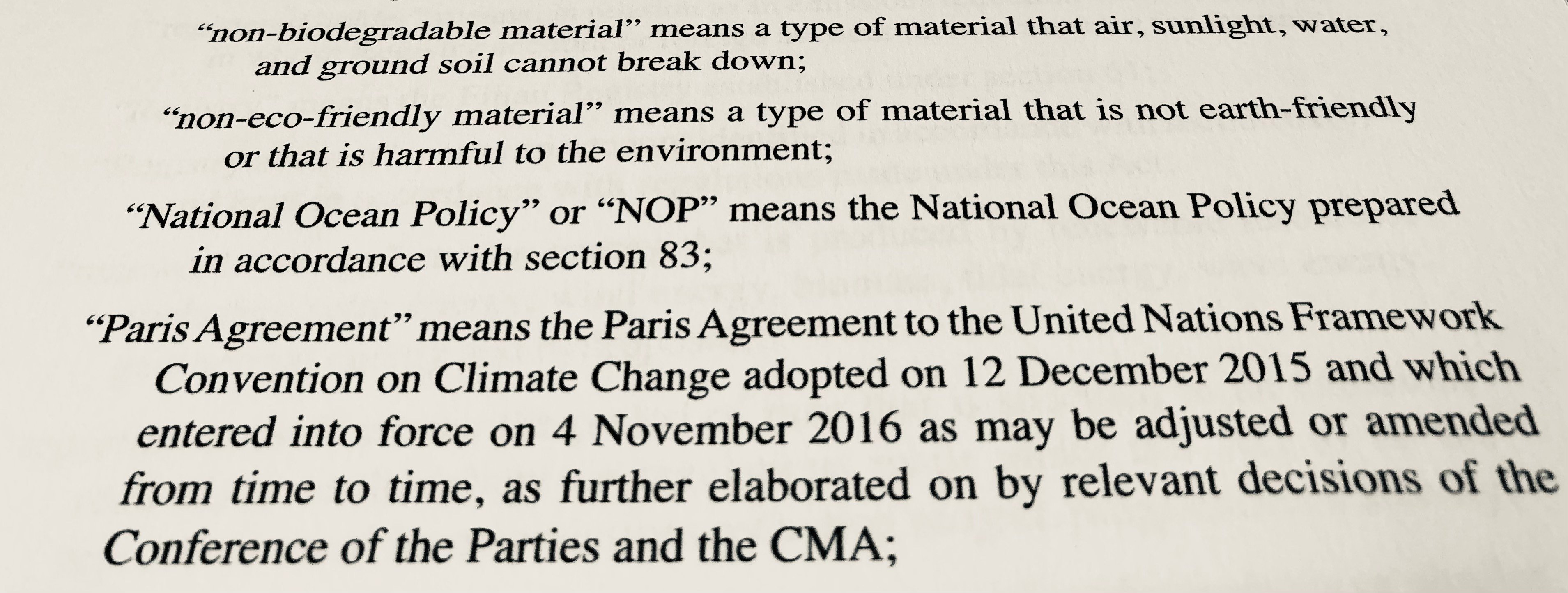
Heading 2 - Carbon Sequestration as part of The Fijian Emissions Reduction Methodologies
As part of Fiji’s efforts to encourage uses of land or its ocean areas to offset emissions by sequestering carbon, Part 10 of the Act sets out the framework for the creation of carbon sequestration property rights over land that may lead to the creation and recognition of personal and tradeable property being a Fijian Mitigation Outcome Unit.
While this part provides a detailed process, its effect may be summarised as follows:
- The Registrar of Titles is provided with the ability to register a carbon sequestration property right on a title to land (while this creates an interest in the land it does not provide right of possession and there are also requirements for 60% approval of the landowning group in relation to iTaukei land)
- Provided the Director develops and the Minister approves Fijian Emission Reduction Methodologies in accordance with s49 then a person who has already registered a carbon sequestration property right may apply to the Director for a Declaration that an emissions reduction project undertaken on that land is a Fijian Emissions Reduction project programme or activity
- Provided that the Director declares that the emission reduction project, programme or activity is a Fijian Emissions Reduction project (and if declined there is an appeal process to the High Court) then on application the Director may approve the Fijian Mitigation Outcome Units to the applicant/proponent of the project, programme or activity and these units which are recognised under Fiji law as personal property are then remitted to the appropriate account of the legal owner of those units.
It is worth noting a few further points:
- This legal process contemplates a new State approved and guaranteed personal property right that will have value and can be traded in accordance Fiji law and regulations that have yet to be made and it may be an offence to attempt to do engage in any of the above activities related to Fijian Emission Reduction projects and the creating or transfer of Fijian Mitigation Outcome Units without the Director’s consent
- Owners of land who register a carbon sequestration property right must note that the land can only have one carbon sequestration property right, and to retain that right they cannot use that land for certain purposes including but not limited to mining and other exploitative activities. Although at present the range of exploitative activities is not defined by the Act. It is respectfully suggested that the term “exploitation” should be further defined and it is noted that this is not a defined term in section 2 of the Act.
- The registration of carbon sequestration property rights, approval of a Fijian Emissions Reduction Project and approval of the Fijian Mitigation Outcome Units and their transfer for value including international transfer are all dependent upon the approval of various State entities including but not limited to the Director, as well as all other legal requirements being met that will be provided by further Regulations.
- The monetary value of the Fijian Mitigation Outcome Units is not known at the present time
- In any project programme or activity involving forests the additional consent of the conservator of forests is required
- Section 60 provides special treatment for transactions under international REDD+ programmes that enables the Government of Fiji to proceed to sell and transfer carbon sequestered by forests including in the form of emissions reductions provided that there is prior and informed consent from the relevant owners of the registered carbon sequestration right and compensation is paid if applicable.

Heading 3 - How the Act attempts to ensure Fiji adapts to the destructive effects of climate change
Part 11 of the Act recognises the threat of climate change to human and other rights and establishes the National Adaptation Plan Steering Committee that has the responsibility to prepare and update successive Fiji National Adaptation Plan (NAP) that should address amongst other things the many and various sectors of Fiji’s economy, infrastructure and natural environment with the aim of minimising risk, increasing resilience and improving adaptation.
The NAP Steering Committee must conduct public and inclusive consultations and include a number of factors set out in the Act including but not limited to traditional knowledge relating to adaptation, and then make recommendations to the Minister in relation to updates to the NAP. It is the Minister who then decides whether to approve the new NAP in accordance with section 67 of the Act.
Pursuant to section 68 the Minister has the power to introduce and implement regulations, policies, measures, adaptation processes and actions with the purpose of increasing Fiji’s resilience and adaptation to climate change in accordance with considerations in section 68 that includes but is not limited to the NAP, the Act, Fiji’s and other relevant policies.
There are further provisions in this part for:
- the creation and modelling of integrated risk scenarios through consultation between the Director and Fiji Meteorological Service that may be included in the Information Platform
- An audit of public infrastructure and physical assets including but not limited to their replacement value and to determine their climate resilience
- Ensuring buildings and infrastructure are climate resilient including but not limited to the approval processes and updating the National building code
- The creation of a Fijian adaptation Registry to register adaptation projects in Fiji.
Part 12 of the Act addresses climate displacement and relocation and this includes the establishment of a Fijian Taskforce on the Relocation and Displacement of Communities Vulnerable to the Impacts of Climate Change (s75) that assists the Minister to prepare successive Fijian Planned Relocation Guidelines. The Minister is then supported by the Taskforce in the responsibility of relocating and supporting at risk communities in accordance with the provisions of section 77 of the Act. This part of the Act provides minimum standards that must be met to assist at-risk communities and there are also a consultation requirement and public hearings prior to any relocation decision.
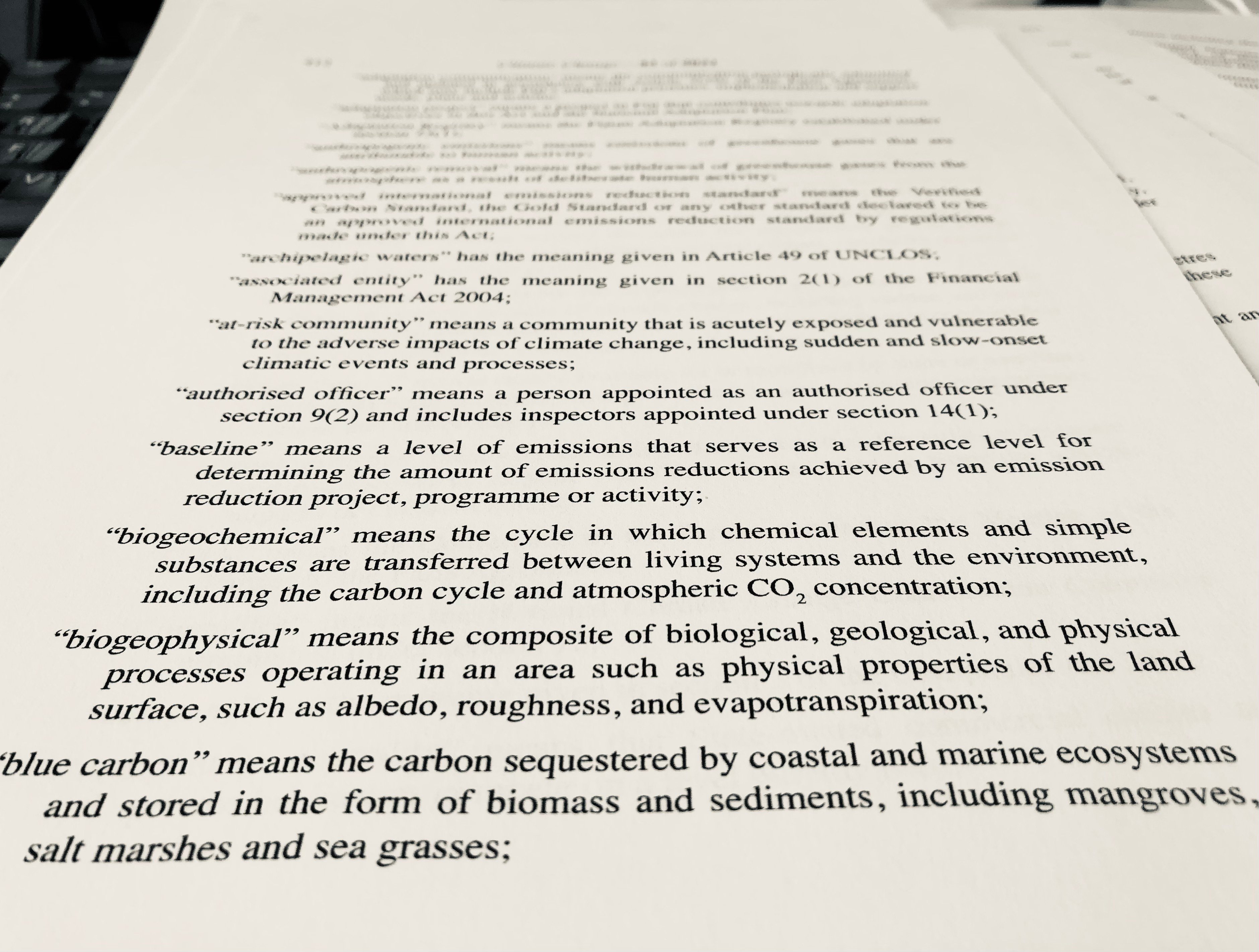
Heading 4 - How the Act addresses Oceans and Climate Change
Part 13 of the Act includes a framework for oceans and further decisions that will be taken in line with Fiji’s international oceans commitments. This part commences by recognising the importance of healthy oceans for climate and amongst other things the importance of oceans for the identity and livelihoods of the people of Fiji, the threats faced for Fiji’s oceans, Fiji’s maritime boundaries and the need for more protection to increase the resilience of oceans (s79).
This part contains some key commitments in relation to Fiji’s oceans and their use and this includes but is not limited to:
- The recognition of the permanence of Fiji’s maritime boundaries and maritime zones created in accordance with UNCLOS regardless of the effects of climate change (s80)
- Fiji’s commitment to ensure all its maritime zones to be 100% sustainably and effectively managed and to designate 30% of its maritime zones as marine protected areas (MPAs)
- The establishment of the National Ocean Policy Steering Committee and its composition including high level representatives from across government Ministries and agencies to keep the NOP under review and prepare successive NOPs via public consultations and in accordance with various considerations set out in the Act including scientific and traditional knowledge
- The recognition that the NOP should guide all government policies in relation to fisheries, marine resources, maritime issues, marine scientific research and other issues related to the use, management and conservation of maritime waters.
In terms of implementation of Fiji’s ocean commitments the Minister retains overall responsibility, and this includes the following examples:
- in relation to Fiji’s commitments for 100% sustainable management and 30% designation of MPAs - the Minister pursuant to s81(3) is required to make all reasonable efforts to promote these aims in accordance with the NOP
- The Minister approves successive NOPs that the Director must include on the Information Platform.
In accordance with s84 the Minister is provided with powers to implement further regulations, policies and actions with the purpose of conservation and restoration of all Fiji’s maritime areas and coastal environments. This includes for:
- protecting stores of blue carbon
- sustainable management of oceans and reducing anthropogenic stresses on marine and coastal ecosystems
- putting in place measures to maintain and reinforce Fiji’s maritime boundaries pursuant to section 80; and
- fiscal incentives and education campaigns supporting alternatives to non biodegradable and non-ecofriendly materials.
While s84 of the Act requires Regulations, policies, measures and actions to use a science-based and data-driven approach, and that the Minister must consult with Ministers responsible for environment and fisheries to the extent that the management of fisheries may be impacted this provides wide powers to implement a number of further measures.
At the present time, (as noted above) under section 81(3) the Minister has responsibility to "promote" the 2030 MPA target, it is not known whether the decision making powers in s84 of the Act will extend to the actual designation of MPAs. At the present time MPAs in Fiji are designated under Fisheries legislation. While this question will, no doubt, be resolved in due course as Fiji implements its ocean commitments in the National Ocean Policy, it is respectfully noted that a designation of a MPA may fit within some of the regulation making powers in s84 of the Act for example regulation making powers: “for the purpose of conservation and restoration”; and “for the sustainable management of oceans and reducing anthropogenic stresses on marine and coastal ecosystems”.
Further section 85 of the Act provides the Minister with the additional power to make (following consultation if there would be an impact on the management of fisheries) regulations, policies and implement measures to enhance the mitigation potential of oceans including:
- enhancing blue carbon
- developing offshore renewable energy generation
- increasing energy efficiency in maritime services.
However, given that MPAs are not specifically mentioned in section 84 it may be the better view that Parliament's intention is that MPA designation should remain a decision for the Minister for Fisheries under relevant Fisheries legislation, and in accordance with, common law decision making processes and considerations.
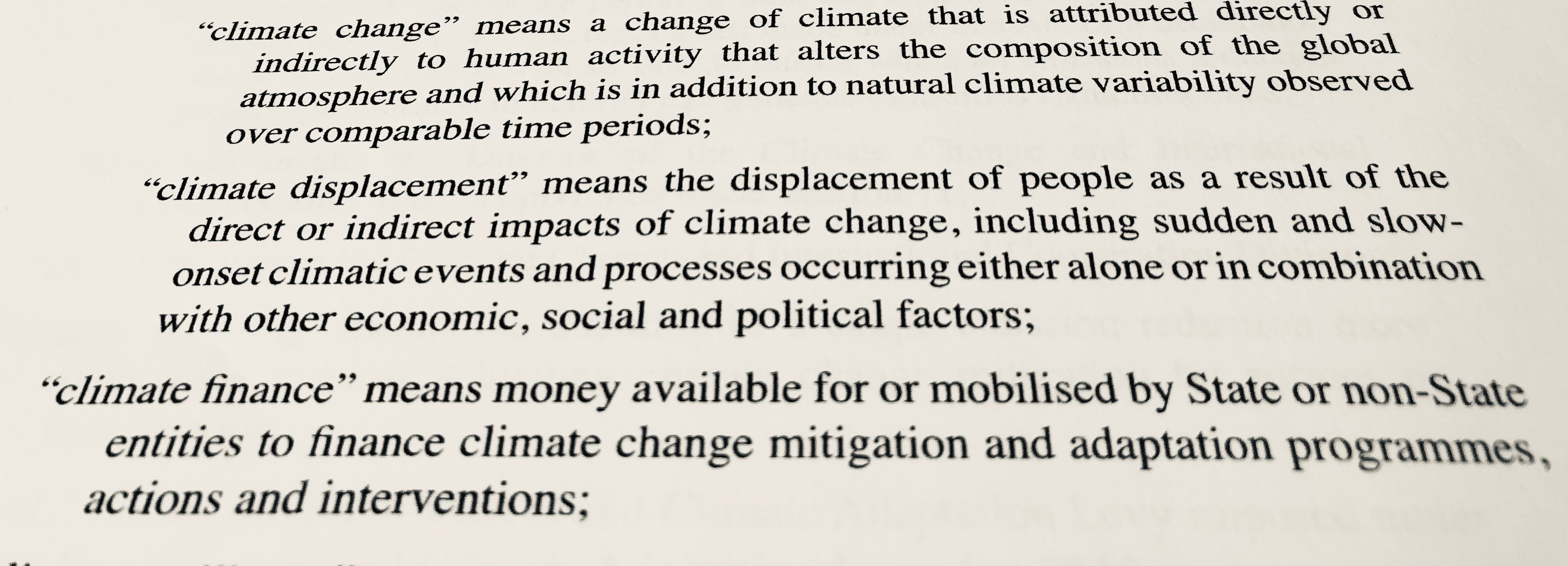
Heading 5 - sustainable financing
Part 14 of the Act provides the framework for the management and coordination of sustainable climate financing. This includes the aim to improve Fiji’s ability to attract climate change finance and to manage and coordinate the use of that finance.
This includes the following key provisions:
- Section 87 empowers the Minister responsible for Finance to play a coordination role between sources of funding including but not limited to the Green Climate Fund, Adaptation fund and multilateral development banks and ensuring funding is coordinated to align with the NCCP
- The Minister responsible for finance can create incentives to promote climate change initiatives by regulation with any regulations that will be created must set out the nature of the incentives
- The Minister can approve State entities or private organisations accredited to climate funds including the Green Climate fund to be recipients and administrators of public or private fund designated for the implementation of mitigation and adaptation to climate change, and with the obligation that they must monitor and evaluate, and publish to the Minister and Minister responsible for finance the results of their actions
- The Minister responsible for finance may establish guidelines for the use of climate finance to be applied by State entities or private organisations to ensure complementarity
- The Minister responsible for finance may create financial instruments and mechanisms with the purpose of implementing the Act and climate change and mitigation and adaptation actions in accordance with the Act
- The Minister responsible for finance in consultation with the Reserve Bank of Fiji must develop national climate finance strategies (reviewable every 5 years), frameworks and approaches to support Fiji’s ongoing access to climate finance, and these must address Fiji’s reading for climate finance including appropriate governance arrangements, accounting systems and transparency frameworks.
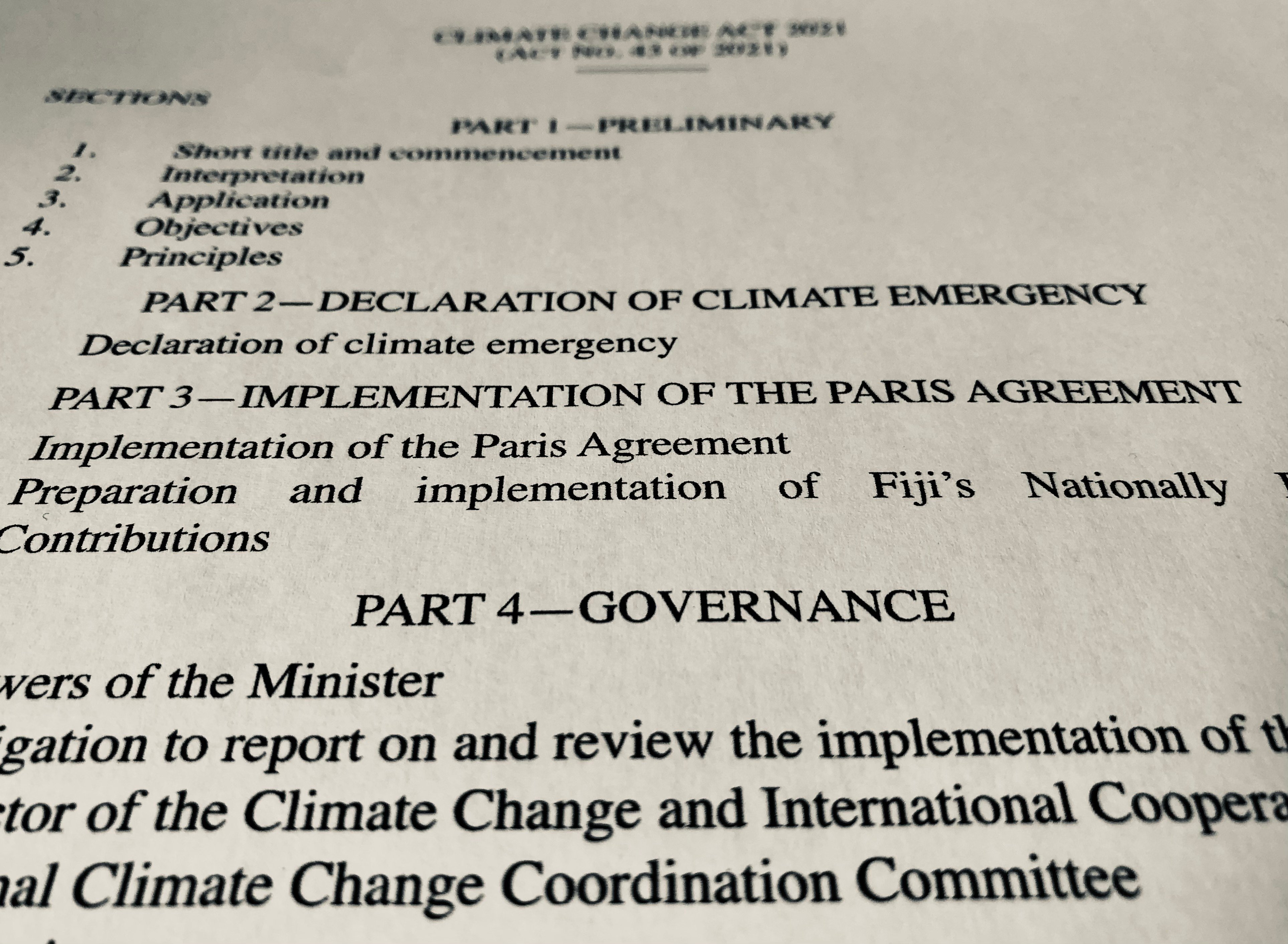
Heading 6 - The implementation of the Act
As the above shows, the Act will create significant obligations, opportunities and changes to many aspects of Fiji’s economy. This includes changes to:
- measure Fiji’s greenhouse gas emissions and limit those emissions progressively towards the net zero 2050 goal
- create new incentives for land use that will sequester (remove and store) carbon
- assist Fiji’s adaptation to climate change and build resilience
- Increase the health and security of its oceans/maritime zones to mitigate the effects of climate change
- Increase and coordinate the flow of sustainable financing.
The Act envisages that these changes will be implemented via various mechanisms, including but not limited to:
- A whole of government approach involving various appointments, reporting lines, and obligations placed on the relevant government Ministries and departments, State entities and Companies
- Government regulations, legal instruments, policies, and codes of conduct
- Enforcement
- Incentives and financial disincentives.
Whole of government approach
To assist the Minister with the various obligations set out above, and in relation to others (including the issuance of Fijian Mitigation Outcome Units and the maintenance of the public Information Platform) the Minister must appoint a Director of the Climate Change and International Cooperation Division.
The Committee established by section 12 is composed of Fiji’s Permanent Secretaries and the Director. The Committee must meet with other relevant State entities including the National Environment Council (NEC) established under the Environment Management Act (EMA) and the State entity responsible for national security on an annual basis to promote a whole of government approach to implement the Act including but not limited to mainstreaming action on climate change in national government, local governments and via Provincial administrations. The Committee has powers to seek assistance from other State entities, form technical working groups and convene consultative meetings with various stakeholders including NGOs.
Further, whole of government action is promoted via section 13 and the requirement for each PS to appoint a focal point within their Ministry to promote the objectives and principles of the Act with an obligation to report to the Direct in relation to implementation within their Ministry.
State entities
Part 5 of the Act and section 18 provides requirements for all State entities to ensure that they and their own policies, programmes and decisions comply with any guidelines published by the Minister in relation to the Act. A failure to comply provides the High Court with power to set aside any decision, policy, programme or process that is non-compliant.
In addition section 19 ensures that all decisions made in accordance with any laws listed in Schedule 1 to the Act that includes but is not limited to laws relating to land use, ocean and natural resource use, development and the environment must be made in a way that takes into account and promotes the objectives and principles of the Act and complies with the Act, the potential impacts of climate change and any impact on Fiji’s emissions (amongst other things).
Further, the Minister is obligated by section 20 to issue decision making guidelines to assist with decision making under the prescribed legislation. The focal point of each Ministry is required by section 21 to take all reasonable steps to ensure that their Ministry supports the implementation of the Act.
In addition to section 19:
- section 22 provides that Environmental Impact Assessments (EIAs) must include an assessment of emissions and measures to address them.
- Section 23 requires the Fijian Procurement Office to create policies to promote adaptation and climate resilience and to source zero or low emission products, vehicles or energy sources
- Section 24 requires all Ministers to keep their Ministries under review in terms of compliance with the Act including but not limited to revising KPIs for their employees
- Section 25 requires the Minister responsible for Education to include evidence based learning about climate change in the national curriculum - at all levels
- Section 26 requires that the Minister responsible for finance must provide information on the economic implications of climate change in the supplement to the national budget, and all State entities must in their budget submissions provide actual and estimated climate relevant expenditure for the purposes of the national budget and budget estimates as well as the financial impacts of climate change on the State entity.
Companies
Section 94 of the Act introduces new requirements relating to the Directors of companies and other officers in exercising their duties of reasonable care and diligence under s106(1) of the Companies Act 2015, meaning that they must “consider and evaluate climate change risks and opportunities to the extent that they are foreseeable and intersect with the interests of the company. Climate change risks are defined in s94 and include the risks relating to the effects of climate change but also the financial risks and opportunities associated with transitioning to a low carbon economy.
There are also specific requirements for FNPF to consider and evaluate climate change risks and opportunities. There are additional requirements for companies and managed investment schemes, the FNPF, the RBF and all licensed financial institutions to prepare financing statements and director’s reports under relevant legislation to prepare and disclose how climate change risks are being evaluated and managed.
Regulations
In terms of Regulations the Act is somewhat unusual in that it contains a number of specific Regulation (and other) making powers conferred on the Minister, as well as a general Regulation making power. For example:
- Section 9 provides a wide Regulation making power to oversee the implementation of the Act via
- new policies or regulations
- economic, fiscal and market based instruments
- convening other ministries into the decision making process
- expert bodies or committees to provide advice
- establishing procedures for wider public consultation for the implementation of the Act.
There is further Regulation making power in relation to Fiji’s efforts to sequester carbon that will support the legal framework in relation to the registration of carbon sequestration property rights over land required as the first step to obtain Fijian mitigation units that will be transferable as personal and exchangeable property.
Further, section 43 of the Act provides the Minister with power to issue significant secondary legislation in the form of Regulations, measures and actions to limit Fiji’s greenhouse gas emissions across the economy.
It is in this contemplated secondary legislation that a number of significant measures will be created to implement the Act. These measures relate to both reducing Fiji’s emissions and increasing carbon sequestration. covers a number of significant and may also introduce other measures including but not limited to:
- A carbon pricing mechanism including an emissions trading scheme
- Prescribing fees and charges payable to the State on the volume of greenhouse gas emissions above a prescribed level
- Introducing fiscal incentives to either limit, reduce of offset emissions, including by enhancing the conservation of natural sinks particularly within natural protected areas and ecological conservation zones and encourage public and private partnership in renewable energies, energy efficient infrastructure and zero waste infrastructure and processes
- enhancing environmental protection of land and ocean carbon sinks in consultation with the ministers responsible for forests, fisheries, agriculture and environment, including with respect to halting and reversing deforestation and degradation of forests, afforestation initiatives, Fiji’s REDD+ initiative, reef and fisheries conservation, mangrove protection and planting initiatives, nature-based coastal protection applications and sustainable agricultural practices
- Making regulations for more sustainable, energy efficient and climate resilient infrastructure and buildings
- Raise awareness of the impacts of production and consumption on climate change.
In addition, section 111 provides a further discretionary power to the Minister to make Regulations “to prescribe matters that are required or permitted by this Act to be prescribed or are necessary or convenient to be prescribed for carrying out or giving effect to this Act generally”. Section 111 includes a list of eleven examples where Regulations may be made. These include but are not limited to Regulations for:
- Fiji’s participation in schemes to regulate emissions from international aviation or international shipping (currently emissions from both are not counted by the Act as Fiji emissions)
- various details relating to enforcement
- limiting or reducing emissions (GHG) across the economy in accordance with s43(1) (a section that we have noted is a significant one for the likely changes to Fiji’s economy)
- increasing Fiji’s resilience to climate change and to adapting to climate change
- promoting an evidence based approach to the conservation and restoration of Fiji’s maritime areas and coastal environments in accordance with s84
- Enhancing the mitigation potential of oceans in accordance with s85.
Section 111(2) provides the discretionary power to the Minister to make regulations that give effect to any provision of this Act and than impose duties or obligations on any person, including State entities.
Section 111(3) provides the Minister with further discretion to make regulations in support of Fiji’s emission reduction programmes including but not limited to who has the right to undertake these programmes, how they will be conducted, monitored and in relation to the consent of landholders and other interest holders.
Enforcement:
the Minister:
- may appoint authorised officers with powers defined in further regulations/legal instruments
- may create codes of practice for government Ministries
- must review the implementation of the Act every 5 years, consult with various other Ministries in relation to this and report Fiji’s progress to Parliament
- must monitor performance in relation to Fiji’s implementation of the Act.
In terms of enforcement of the Act, section 14 makes all Inspectors appointed under EMA authorised officers for the purposes of the Act and provides their powers including wide powers of investigation linked to their enforcement function including powers to enter and obtain evidence (sections 15 and 16) and the power to issue an Improvement Notice that creates an obligation to comply for face a fine of up to $750,000. Further Regulations (discussed above) are contemplated in relation to improvement notices and their form.
Part 16 of the Act specifically addresses enforcement further and makes various provisions in relation to:
- limitation periods for offences (generally 3 years)
- Offences of providing false information
- General penalties (note the starting point for some of the offences is a fine of $750,000 or imprisonment for a term not exceeding 10 years or both)
- The enforcement of the Act by 3rd persons to bring proceedings in the High Court for an order to remedy or restrain any breach of the Act
- Further powers of the High Court when convicting a person for an offence including but not limited to: prohibition orders and other orders to remedy the breach including but not limited to ordering the removal of buildings and infrastructure, payments to the State and for compensation for loss or damage to the person who has suffered as a result of the breach.
Section 106 applies to all employees who are protected from adverse employment action for reporting their employer for a contravention of the Act.
Section 107 provides the express right for any person who has suffered loss as a result of a breach of the Act to start a civil claim in a court including for:
- economic loss resulting from the breach or from activities undertaken to prevent, mitigate, manage, clean up or remedy the breach
- loss of earnings arising from damage to any natural resources;
- loss to or of any natural environment or resource
- costs incurred in any inspection, audit or investigation undertaken to determine the nature of any pollution incident or to investigate remediation options.
Section 108 of the Act creates liability for directors, officers, employees or agents of companies who directed, authorised, assented to, acquiesced in or participated in the commission of the offence also commits the offence, and is liable to the penalty prescribed for the offence, whether or not the company has been prosecuted or convicted.
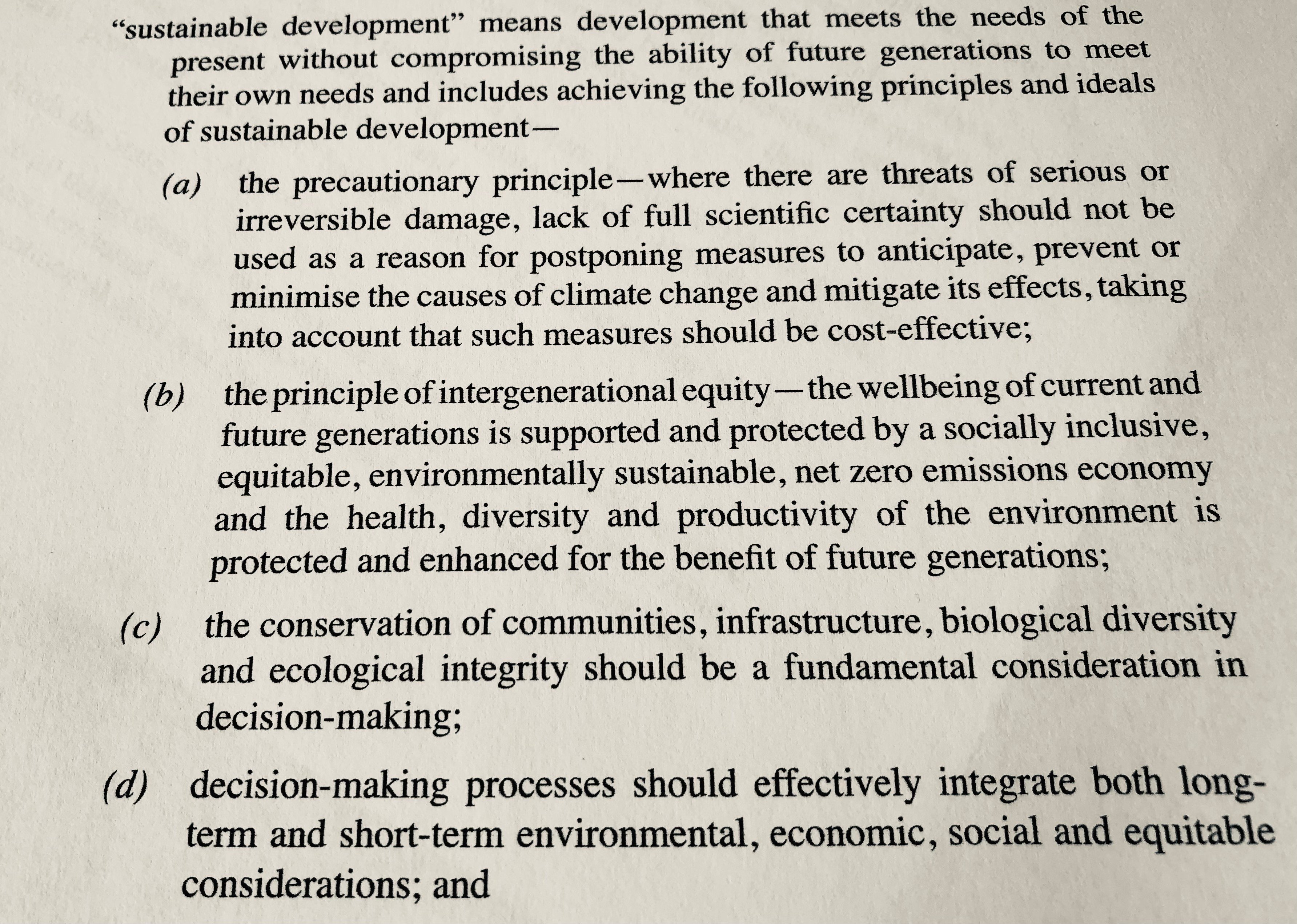
Concluding comments
Addressing the causes and effects of climate change is the challenge of our times. The Act represents a laudable achievement for Fiji to both find ways to reduce carbon emissions and to encourage the sequestration of carbon.
However, the framework that the Act sets out requires implementation and Fiji's faces numerous challenges including but not limited to sustainable sources of finance to make the changes that the Act envisages.
In addition, Fiji is not, and never has been a cause of the emissions that have led to climate change. The countries that have, and continue to do so, are well known and this Act shows that if Fiji is prepared to make this sort of commitment then other countries, including Fiji's bigger neighbours should also consider what they are prepared to do to make the necessary changes.
Please note
- This bulletin is provided for information purposes only and it is not legal advice and should not be relied on as such.
- This bulletin does not reflect or purport to reflect the views of the Fiji government or any Ministry of the Fiji government.
- If you would like a pdf version of the Act please email: james@sas.com.fj

